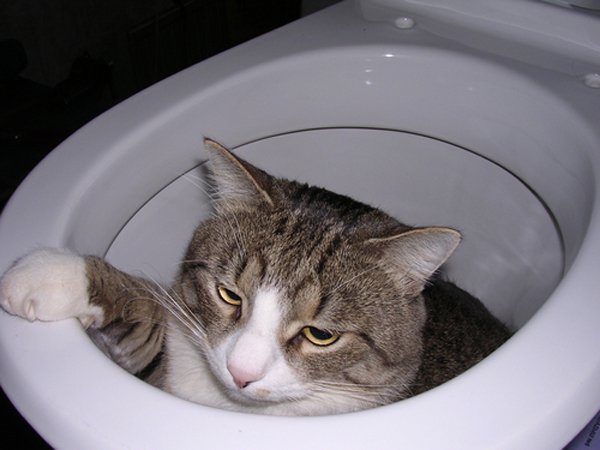Avoid Bathroom Emergencies: Never Flush Cat Poop Down Your Toilet - Professional Advice
Avoid Bathroom Emergencies: Never Flush Cat Poop Down Your Toilet - Professional Advice
Blog Article
This article below pertaining to Don’t flush cat feces down the toilet is exceedingly captivating. You should check this stuff out.
:max_bytes(150000):strip_icc()/0S1A1090-49a8e2c66f8e41d6901f2559787a7f24.jpg)
Introduction
As cat proprietors, it's important to bear in mind just how we deal with our feline friends' waste. While it might seem convenient to flush feline poop down the bathroom, this technique can have detrimental effects for both the setting and human health.
Ecological Impact
Flushing cat poop presents unsafe virus and bloodsuckers right into the water, posing a substantial threat to water communities. These pollutants can negatively influence aquatic life and concession water quality.
Health Risks
Along with ecological issues, purging pet cat waste can likewise pose health and wellness threats to people. Cat feces might contain Toxoplasma gondii, a parasite that can cause toxoplasmosis-- a possibly serious illness, particularly for expectant women and individuals with weakened immune systems.
Alternatives to Flushing
The good news is, there are safer and more accountable methods to take care of feline poop. Take into consideration the following alternatives:
1. Scoop and Dispose in Trash
The most common approach of dealing with cat poop is to scoop it right into a biodegradable bag and throw it in the trash. Be sure to use a specialized clutter inside story and take care of the waste immediately.
2. Use Biodegradable Litter
Select naturally degradable pet cat litter made from materials such as corn or wheat. These clutters are environmentally friendly and can be securely gotten rid of in the garbage.
3. Hide in the Yard
If you have a yard, think about hiding cat waste in a marked area away from veggie gardens and water resources. Make sure to dig deep adequate to prevent contamination of groundwater.
4. Mount a Pet Waste Disposal System
Purchase a pet garbage disposal system especially made for pet cat waste. These systems use enzymes to break down the waste, minimizing smell and environmental impact.
Conclusion
Liable family pet ownership expands beyond giving food and sanctuary-- it additionally entails proper waste monitoring. By avoiding flushing cat poop down the commode and opting for different disposal approaches, we can minimize our environmental impact and safeguard human health and wellness.
Why You Should Never Flush Cat Poop Down the Toilet
A rose by any other name might smell as sweet, but not all poop is created equal. Toilets, and our sewage systems, are designed for human excrement, not animal waste. It might seem like it couldn’t hurt to toss cat feces into the loo, but it’s not a good idea to flush cat poop in the toilet.
First and foremost, assuming your cat uses a litter box, any waste is going to have litter on it. And even the smallest amount of litter can wreak havoc on plumbing.
Over time, small amounts build up, filling up your septic system. Most litter sold today is clumping; it is made from a type of clay that hardens when it gets wet. Ever tried to scrape old clumps from the bottom of a litter box? You know just how cement-hard it can get!
Now imagine just a small clump of that stuck in your pipes. A simple de-clogger like Drano isn’t going to cut it. And that means it’s going to cost you big time to fix it.
Parasitic Contamination
Believe it or not, your healthy kitty may be harboring a nasty parasite. Only cats excrete Toxoplasma in their feces. Yet it rarely causes serious health issues in the cats that are infected. Most people will be fine too if infected. Only pregnant women and people with compromised immune systems are at risk. (If you’ve ever heard how women who are expecting are excused from litter cleaning duty, Toxoplasma is why.)
But other animals may have a problem if infected with the parasite. And human water treatment systems aren’t designed to handle it. As a result, the systems don’t remove the parasite before discharging wastewater into local waterways. Fish, shellfish, and other marine life — otters in particular — are susceptible to toxoplasma. If exposed, most will end up with brain damage and many will die.
Depending on the species of fish, they may end up on someone’s fish hook and, ultimately on someone’s dinner plate. If that someone has a chronic illness, they’re at risk.
Skip the Toilet Training
We know there are folks out there who like to toilet train their cats. And we give them props, it takes a lot of work. But thanks to the toxoplasma, it’s not a good idea.

We were shown that write-up about Can You Flush Cat Poo or Litter Down the Toilet? through a friend on our other website. Are you aware of another person who is occupied with the niche? Take a moment to promote it. Thank you for your time. Don't forget to pay a visit to our website back soon.
Go Deal Now Report this page